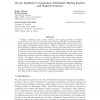Free Online Productivity Tools
i2Speak
i2Symbol
i2OCR
iTex2Img
iWeb2Print
iWeb2Shot
i2Type
iPdf2Split
iPdf2Merge
i2Bopomofo
i2Arabic
i2Style
i2Image
i2PDF
iLatex2Rtf
Sci2ools
103
click to vote
JAIR
2008
2008
On the Qualitative Comparison of Decisions Having Positive and Negative Features
Making a decision is often a matter of listing and comparing positive and negative arguments. In such cases, the evaluation scale for decisions should be considered bipolar, that is, negative and positive values should be explicitly distinguished. That is what is done, for example, in Cumulative Prospect Theory. However, contrary to the latter framework that presupposes genuine numerical assessments, human agents often decide on the basis of an ordinal ranking of the pros and the cons, and by focusing on the most salient arguments. In other terms, the decision process is qualitative as well as bipolar. In this article, based on a bipolar extension of possibility theory, we define and axiomatically characterize several decision rules tailored for the joint handling of positive and negative arguments in an ordinal setting. The simplest rules can be viewed as extensions of the maximin and maximax criteria to the bipolar case, and consequently suffer from poor decisive power. More decisiv...
Related Content
| Added | 12 Dec 2010 |
| Updated | 12 Dec 2010 |
| Type | Journal |
| Year | 2008 |
| Where | JAIR |
| Authors | Didier Dubois, Hélène Fargier, Jean-François Bonnefon |
Comments (0)

